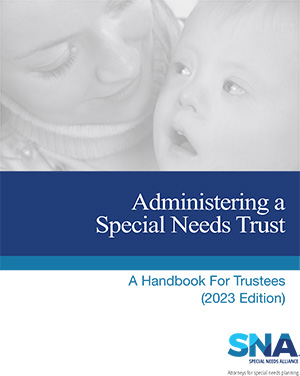CASE STUDY: Special needs child - public benefits retained
THE SITUATION
Harry and Sally have a 21-year-old son, Bill, who has autism and lives at home with them. The couple is concerned about protecting Bill's welfare after they die. They had always expected Bill to go live with his sister Joan, who is married and has three children. But recently, they learned that Joan's husband does not want to take on this responsibility. Harry and Sally now need to make alternate arrangements for their son's future.
Harry and Sally own a home, have retirement plans, life insurance and approximately $500,000 in assets. Bill receives Supplemental Security Income (SSI) payments and Medicaid health insurance coverage and is eligible for a group home environment. By law, these benefits are available to Bill only if he has limited income and no more than $2,000 in assets.
THE CHALLENGE
If Bill receives an inheritance from his parents, he will exceed SSI's $2,000 asset limit and lose his benefits. If he loses SSI, he will become ineligible for Medicaid.
THE GOAL
Harry and Sally's greatest concern is what will happen to Bill once they die. They want to use some of their assets to ensure that Bill's housing, medical and day-to-day living needs will always be met and that he will enjoy a good quality of life. But they must do this without jeopardizing his public benefits.
THE FIRST STEP
Harry and Sally sought the advice of a lawyer who specializes in estate planning for individuals with special needs. That was important because, while many lawyers write wills, only those who specialize in handling cases concerning people with special needs are knowledgeable about public benefits and disabilities.
If Harry and Sally had not known how to find a qualified attorney, they could have contacted the Special Needs Alliance, an organization of leading special needs attorneys around the country who specialize in planning for people with special needs.
WHAT FAMILIES SHOULD KNOW
Harry and Sally's attorney helped them secure their son Bill's future through careful estate planning. If you are the parent of a special needs child and have not yet put in place a plan for your child's future, it is important to seek the advice of an elder and disability law attorney. That individual will help you understand the role of Special Needs Trusts in your estate plan and guide you through many important considerations.
WHAT IS A SPECIAL NEEDS TRUST?
A Special Needs Trust is a discretionary, spendthrift trust created for a person who is elderly or disabled as a way to supplement the person's public benefits. Those public benefits may include SSI, Medicaid, Section 8 Housing and other federally or state-sponsored assistance programs.
WHAT ARE THE ADVANTAGES OF A SPECIAL NEEDS TRUST?
A Special Needs Trust can:
- Help maintain an individual's potential eligibility for a group home.
- Purchase a home for the individual.
- Pay for services that Medicaid does not cover, including home care and such items as wheelchairs, handicap accessible vans and mechanical beds.
- Pay for a personal attendant, should that be required.
- Pay for recreational and cultural experiences.
- Help enrich the beneficiary's life
WHAT REQUIREMENTS MUST BE MET WHEN ESTABLISHING A SPECIAL NEEDS TRUST?
There are two key requirements:
- The trustee must be given absolute control over the distribution of the funds.
- The person with special needs cannot have the authority to revoke the trust.
HOW CAN THE AMOUNT OF FUNDING REQUIRED FOR A SPECIAL NEEDS TRUST BE DETERMINED?
The best way for parents to determine how much of their estate to leave to a special needs child is to obtain a life care plan from a professional Life Care Planner. That individual will estimate the cost of the child's care over a typical lifetime.
If there are insufficient funds available, parents may consider buying a life insurance policy. With one type of policy, upon the death of the second parent, the insurance proceeds are paid to the Special Needs Trust for the care of the person with special needs.
Once Harry and Sally understood the key issues and considerations involved in setting up a Special Needs Trust, they were ready to select a trustee.
Once Harry and Sally understood the key issues and considerations involved in setting up a Special Needs Trust, they were ready to select a trustee.
Selecting a trustee for a Special Needs Trust is one of the most important steps in the planning process, because the trustee will be empowered to manage the life of the child with special needs.
A special needs trustee should have these characteristics:
- A long-term commitment.
- A special sensitivity to the individual's disabilities.
- Active involvement in monitoring the client's services.
- The ability to be an advocate for medical and financial entitlements.
- The ability to be a prudent investor and distributor of trust funds.
While family members often want to serve as trustee, they typically don't possess all of the necessary qualifications. For that reason, it is strongly recommended that families retain a professional trustee to oversee the Special Needs Trust, with a family member named as co-trustee.
If a family selects a professional trustee from a bank, they should be sure that the bank has a trust department with an excellent track record for managing money. If a family chooses an attorney to serve as the professional trustee, they should be certain that he or she has a good track record in managing trust money, or that he or she will arrange to hire a professional money manager to oversee trust investments.
Families should be aware that a trustee's annual fees typically range from 1% to 1.5% of the trust assets. These annual fees are a very worthwhile investment toward the preservation of the security and quality of life of a child with disabilities.
Lawyers for Living Trusts and Wills
HOW IS TRUST ACCOUNTING HANDLED?
The Social Security Administration requires an annual accounting of the expenditure of funds in a Special Needs Trust. This accounting is intended to ensure that trust funds have not been mishandled and serves to protect the person with special needs and any other beneficiaries of the trust.
Because the accounting work is fairly technical and must adhere to the rules of the Principal and Income Act, it is best handled by an accountant, who can be hired by the trustee.
Harry and Sally considered all of these issues before selecting a professional trustee and naming Bill's sister, Joan, as co-trustee.
WHAT SHOULD A SPECIAL NEEDS TRUSTEE KNOW ABOUT SSI?
The Supplemental Security Income (SSI) federal program is a minimum monthly cash payment for the aged, blind or disabled. To qualify for SSI, a special needs individual must meet specific SSI definitions of disability or blindness. SSI eligibility also is "needs based," with a limit on income and assets. SSI should not be confused with other Social Security benefits, such as retirement, survivor, dependent or other disability benefits. SSI payments are dedicated to paying for the food and shelter of a person with a disability.
If an individual with disabilities has a Special Needs Trust, the trustee must thoroughly understand SSI rules and Medicaid laws to prevent any reduction in available benefits. For example, if distributions from the trust are made directly to the individual, SSI benefits will be reduced, dollar for dollar. If SSI benefits are eliminated, the individual will no longer be eligible for Medicaid.
It is the trustee's responsibility to pay the expenses of the special needs person directly to third parties. Payments for goods and services other than food and shelter have no effect on SSI. These types of payments are called "in-kind support and maintenance" or ISM.
WHAT IS THE ROLE OF A CARE MANAGER?
A Special Needs Trust can direct the trustee to hire a care manager. That individual specializes in making the necessary arrangements to provide the special needs individual with the level of care he or she requires. The care manager should have a social work background and related expertise and be knowledgeable about all social service programs available to assist the beneficiary.
A good care manager will:
- Monitor the individual's progress.
- Ensure that the individual's needs are met.
- Coordinate nutrition and cleanliness programs.
- Make sure that exercise and physical therapy programs are maintained.
- Coordinate any socialization or psychological counseling.
- Ensure that the special needs person has assistive devices, if needed.
- Have a plan and a responsible advocate available to resolve problems in a quick and timely manner in the event of an emergency.
WHAT IS A LETTER OF INTENT?
As part of the process of planning for the future of a special needs child, it is very important for parents to write a Letter of Intent laying out their wishes for the child's care. A Letter of Intent provides parents with an opportunity to explain, in detail, their child's unique life and background. The letter helps ensure that those responsible for the child's care in the future will see him or her as a "real," multi-faceted person, rather than a number, statistic or faceless subject in a legal document. The letter also serves as a vital document for the trustee, providing him or her with a greater understanding of the child, and ensuring that the family's specific wishes, goals and expectations can be carried out.
A typical Letter of Intent details the child's:
- Unique personality traits
- Medical history and special needs.
- Special education, past and present.
- Treatment, therapy and daily care needs.
- Favorite foods and clothing.
- Friends, co-workers and family members - anyone who is close to the child.
- Favorite recreational activities and sports.
- Past vacations and those he or she hopes to take in the future.
MISSION ACCOMPLISHED
Harry and Sally were thankful for the methodical, thoughtful estate-planning process their attorney helped them undertake. Setting up a Special Needs Trust and appointing a trustee as well as a family member co-trustee helped eliminate their unrelenting worry and anxiety about Bill's future. With these decisions made, Harry and Sally could look forward to and enjoy their lives, knowing that Bill would be provided for through both public benefits and his Special Needs Trust.
Call (720) 200-4025 now or email us to find out how our attorneys can help with your Special Needs Trusts issues.
Bradley J. Frigon is a Denver Estate Lawyer Firm in Colorado. Our main offerings include: Elder Law Lawyers for protecting assets and an Estate Planning Attorney for all aspects of wills, trusts and estate administration.
Common Tags:Special Needs Trust Lawyer Denver CO, Greenwood Village Colorado Attorney Living Trusts, Centennial Estate Planning Lawyers, Arapahoe County Last Will and Testament Attorneys, Family, Medicaid, Trustee, Irrevocable, Revocable, Supplemental













